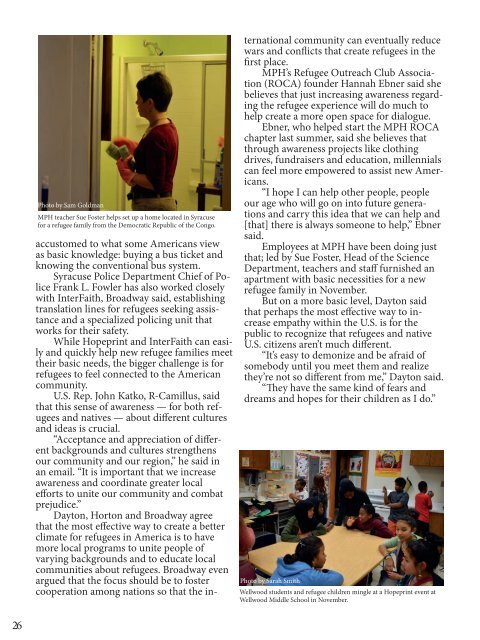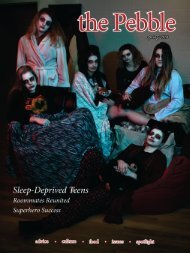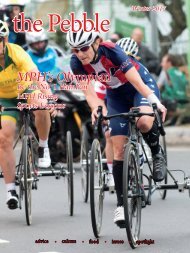You also want an ePaper? Increase the reach of your titles
YUMPU automatically turns print PDFs into web optimized ePapers that Google loves.
Photo by Sam Goldman<br />
<strong>MPH</strong> teacher Sue Foster helps set up a home located in Syracuse<br />
for a refugee family from the Democratic Republic of the Congo.<br />
accustomed to what some Americans view<br />
as basic knowledge: buying a bus ticket and<br />
knowing the conventional bus system.<br />
Syracuse Police Department Chief of Police<br />
Frank L. Fowler has also worked closely<br />
with InterFaith, Broadway said, establishing<br />
translation lines for refugees seeking assistance<br />
and a specialized policing unit that<br />
works for their safety.<br />
While Hopeprint and InterFaith can easily<br />
and quickly help new refugee families meet<br />
their basic needs, the bigger challenge is for<br />
refugees to feel connected to the American<br />
community.<br />
U.S. Rep. John Katko, R-Camillus, said<br />
that this sense of awareness — for both refugees<br />
and natives — about different cultures<br />
and ideas is crucial.<br />
“Acceptance and appreciation of different<br />
backgrounds and cultures strengthens<br />
our community and our region,” he said in<br />
an email. “It is important that we increase<br />
awareness and coordinate greater local<br />
efforts to unite our community and combat<br />
prejudice.”<br />
Dayton, Horton and Broadway agree<br />
that the most effective way to create a better<br />
climate for refugees in America is to have<br />
more local programs to unite people of<br />
varying backgrounds and to educate local<br />
communities about refugees. Broadway even<br />
argued that the focus should be to foster<br />
cooperation among nations so that the international<br />
community can eventually reduce<br />
wars and conflicts that create refugees in the<br />
first place.<br />
<strong>MPH</strong>’s Refugee Outreach Club Association<br />
(ROCA) founder Hannah Ebner said she<br />
believes that just increasing awareness regarding<br />
the refugee experience will do much to<br />
help create a more open space for dialogue.<br />
Ebner, who helped start the <strong>MPH</strong> ROCA<br />
chapter last summer, said she believes that<br />
through awareness projects like clothing<br />
drives, fundraisers and education, millennials<br />
can feel more empowered to assist new Americans.<br />
“I hope I can help other people, people<br />
our age who will go on into future generations<br />
and carry this idea that we can help and<br />
[that] there is always someone to help,” Ebner<br />
said.<br />
Employees at <strong>MPH</strong> have been doing just<br />
that; led by Sue Foster, Head of the Science<br />
Department, teachers and staff furnished an<br />
apartment with basic necessities for a new<br />
refugee family in November.<br />
But on a more basic level, Dayton said<br />
that perhaps the most effective way to increase<br />
empathy within the U.S. is for the<br />
public to recognize that refugees and native<br />
U.S. citizens aren’t much different.<br />
“It’s easy to demonize and be afraid of<br />
somebody until you meet them and realize<br />
they’re not so different from me,” Dayton said.<br />
“They have the same kind of fears and<br />
dreams and hopes for their children as I do.”<br />
Photo by Sarah Smith<br />
Wellwood students and refugee children mingle at a Hopeprint event at<br />
Wellwood Middle School in November.<br />
26





